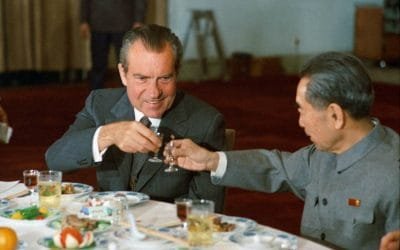On October 12, 1492, Christopher Columbus discovered the New World, opening a sea route to vast uncharted territories that awaited the spread of Western civilization. Centuries later, the ensuing cultural migration culminated in the birth and explosive growth of the greatest nation in history: the United States of America.
It is fitting that we have set aside a day to honor the Great Explorer. On one level, Columbus Day honors the man himself for his many virtues. Columbus was a man of independent mind, who steadfastly pursued his bold plan for a westward voyage to the Indies despite powerful opposition–a man of courage, who set sail upon a trackless ocean with no assurance that he would ever reach land–a man of pride, who sought recognition and reward for his achievements.
We need not evade or excuse Columbus’s flaws–his religious zealotry, his enslavement and oppression of natives–to recognize that he made history by finding new territory for a civilization that would soon show mankind how to overcome the age-old scourges of slavery, war, and forced religious conversion.
Thus, the deeper meaning of Columbus Day is to celebrate the rational core of Western civilization, which flourished in the New World like a pot-bound plant liberated from its confining shell, demonstrating to the world what greatness is possible to man at his best.
On Columbus Day, we celebrate the civilization whose philosophers and mathematicians, men such as Aristotle, Archimedes, and Euclid, displaced otherworldly mysticism by discovering the laws of logic and mathematical relationships, demonstrating to mankind that reality is a single realm accessible to human understanding.
On Columbus Day, we celebrate the civilization whose scientists, men such as Galileo, Newton, Darwin, and Einstein, banished primitive superstitions by discovering natural laws through the scientific method, demonstrating to mankind that the universe is both knowable and predictable.
On Columbus Day, we celebrate the civilization whose political geniuses, men such as John Locke and the Founding Fathers, defined the principles by which bloody tribal warfare, religious strife, and, ultimately, slavery could be eradicated by constitutional republics devoted to protecting life, liberty, property, and the selfish pursuit of individual happiness.
On Columbus Day, we celebrate the civilization whose entrepreneurs, men such as Rockefeller, Ford, and Gates, transformed an inhospitable wilderness populated by frightened savages into a wealthy nation of self-confident producers served by highways, power plants, computers, and thousands of other life-enhancing products.
On Columbus Day, in sum, we celebrate Western civilization as history’s greatest cultural achievement. What better reason could there be for a holiday?
Copyright Ayn Rand Institute. All rights reserved. That the Ayn Rand Institute (ARI) has granted permission to Capitalism Magazine to republish this article, does not mean ARI necessarily endorses or agrees with the other content on this website.










